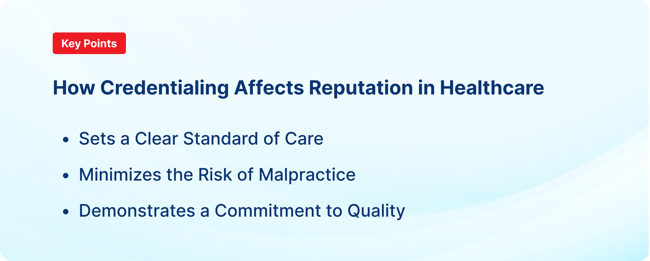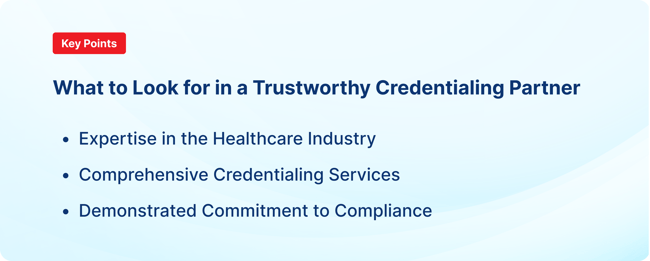

Provider credentialing is essential. Healthcare organizations must have bylaws in place that define...

With the rise of online reviews and social media, a single negative experience can damage a hospital or clinic's reputation and lead to lost revenue. Every organization needs a healthcare reputation management strategy that prioritizes credentialing, or the process of verifying healthcare professionals’ qualifications and competence.
By ensuring that only qualified and competent individuals provide care, healthcare organizations can minimize the risk of malpractice, improve patient outcomes, and build trust with patients and their families.
Explore how credentialing affects reputation in healthcare and how to select a trustworthy credentialing partner.
Key Takeaways
|
Reputation management affects patient trust, financial stability, and brand image. Here are some of the reasons why a positive online reputation matters to your organization.
Managing reputation has become more important in this era of consumerized healthcare. Patients have evolved from passive recipients of care into active consumers demanding exceptional service and convenience. They gravitate to healthcare providers who prioritize patient satisfaction and positive experiences. Consequently, you must diligently manage your online reputation to remain competitive.
A proactive approach to online reputation management requires continuous monitoring of patient reviews on websites and social media platforms. Be ready to respond to feedback quickly, both to negative and positive reviews.
Search engine optimization on search engines matters, too. When people go online and see your healthcare organization in a positive light, you can foster trust, attract new patients, and solidify your position as a reputable and reliable provider of healthcare services.
A healthcare provider's reputation can make or break a hospital or clinic, as negative reviews can drive consumers elsewhere, costing your organization revenue in the short and long term. Nearly 75% of potential patients use online reviews to evaluate potential providers, according to a RepuGen survey of U.S. consumers. Almost 80% won’t consider providers with less than a four-star rating.
A poor reputation isn’t just bad for revenue; it also erodes trust among patients and their families, and it can affect talent attraction and retention. Additionally, a poor reputation can affect your organization's ability to partner with other healthcare providers and institutions.

Credentialing isn't just a regulatory requirement; it’s a strategic imperative for healthcare organizations seeking to cultivate a positive reputation. Here are three benefits of credentialing for your reputation.
Credentialing is a benchmark for the standard of care. A healthcare facility with a strong reputation for quality care naturally attracts new patients. A tarnished reputation, exacerbated by inadequate credentialing practices, reduces trust, increases negative word-of-mouth, and contributes to declines in patient volume.
Credentialing plays a crucial role in risk mitigation. When organizations assess healthcare professionals’ qualifications and competence before granting privileges, they reduce the likelihood of patient harm. This proactive approach also reduces a healthcare provider’s legal risks.
Credentialing is part of any healthcare organization's dedication to quality and compliance. Patients are more likely to perceive an organization as trustworthy and reliable when they recognize the importance placed on proper credentialing. This positive perception elevates the organization's reputation, making it more attractive to patients, healthcare professionals, and other stakeholders.
Credentialing ensures that all providers and staff have the required qualifications and credentials for their job roles. By emphasizing this important step, you can improve your organization’s reputation and trustworthiness among patients and the broader community. Here are three ways to use credentialing to improve reputation.
Credentialing excludes low-quality providers from your organization. Your patients receive only the best care from qualified and experienced healthcare professionals. This reduces the risk of medical errors and improves patient outcomes, which contributes to increased patient satisfaction and word-of-mouth.
Hiring only qualified professionals can also improve your reputation among the profession, helping you hire and retain additional talent.
Demonstrating regulatory compliance is also essential for building trust with patients and other stakeholders. When patients know that their healthcare providers operate in accordance with state and federal regulations, they'll be more confident in the care they receive. This can lead to increased patient satisfaction and a positive reputation for the healthcare organization.
A culture of compliance can also strengthen trust and loyalty among your staff, as they’ll feel confident that doing the right thing — and speaking up if they see something — will be respected and rewarded.
Credentialing can also be used to attract new patients and grow a healthcare organization's business. When patients know that they can receive high-quality care from qualified and experienced healthcare professionals, they’re more likely to choose that organization for their care — and tell others. This can lead to increased patient volume and a positive reputation for the healthcare organization.
Your recruiting and retention efforts also benefit from a positive reputation, as potential employees want to be associated with a respected employer brand.

You want your healthcare facility to show up positively in search results — not for poor reviews or negative news stories. Here are some of the essential components to build into your credentialing strategy.
Credentialing verifies that the information provided by candidates is accurate and authentic. This can be done by checking primary sources, such as state licensure boards and the National Practitioner Data Bank.
Medical staff services personnel at receiving institutions should go beyond the minimum requirements when investigating new-hire credentials. If a practitioner has ever been under investigation — even if the investigation didn’t produce anything substantial — medical staff services professionals have an obligation to learn more.
Red flags during the medical credentialing process include a candidate submitting false or misleading information, not disclosing past or current disciplinary actions, or failing to provide required documentation. Any discrepancies or missing information should trigger further investigation.
Exercising appropriate due diligence could prevent the next “Dr. Death” from gaining privileges to practice, protecting your reputation and your patients’ lives.
Provider credentials aren't static. They can change over time due to changes in licensure, certifications, and malpractice history. It's essential to have a system in place to monitor and update provider credentials.
Tools like PreCheck’s LicenseManager Pro® streamline the process so you can confidently maintain credential compliance in your organization.
Your credentialing practices should be consistent so that staff know what to do, candidates and employees aren’t confused, and your processes align with industry standards and organizational needs. Consistent credentialing requires setting criteria, giving clear instructions, regularly communicating changes to staff, and conducting audits to ensure compliance. Make sure staff are trained on your policies and can access ongoing education and professional development.

Choosing the right credentialing partner is crucial for healthcare reputation management. Here are some key factors to consider when selecting a trustworthy credentialing partner for your organization.
Look for a partner with a deep understanding of healthcare’s complex regulatory environment and the unique challenges of healthcare credentialing. Experience is key. Look for a record of collaborating with healthcare organizations to streamline credentialing processes and mitigate risk.
Your partner should offer services such as primary source verification, background checks, and privileging. Don’t forget about ongoing monitoring services to ensure that your organization remains compliant. Additionally, look for a partner that demonstrates a commitment to the latest industry standards and regulations. The company you choose should be proactive in identifying and addressing issues.
Choose a partner with a robust quality assurance program, including regular audits, internal controls, and adherence to best practices. By partnering with a trustworthy credentialing organization, you can safeguard your organization's reputation, protect patient safety, and ensure regulatory compliance, allowing you to focus on delivering exceptional healthcare services.
By investing in a thorough and comprehensive credentialing process, healthcare facilities can build trust with their patients and establish themselves as reputable and trustworthy providers. Prioritize credentialing as a critical component of your reputation management strategy to maintain a positive image and thrive in a competitive healthcare industry.
Want to learn more? Schedule a call with one of our background screening experts.

Provider credentialing is essential. Healthcare organizations must have bylaws in place that define...

In healthcare, patient safety and regulatory compliance often hinge on one essential task: making...

As a Medical Staff Professional, you know how important it is to vet providers thoroughly. After...